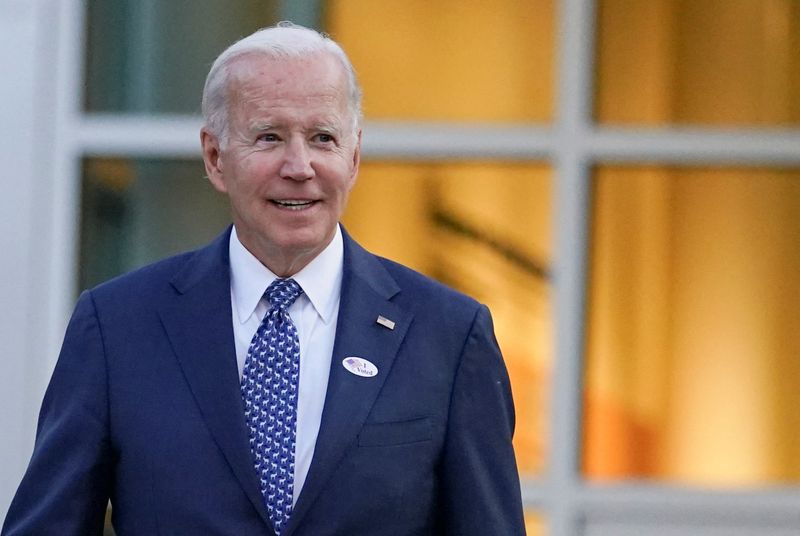By Trevor Hunnicutt and Alexandra Alper
WASHINGTON (Reuters) -U.S. President Joe Biden on Tuesday made a plea for Congress to pass a bill that would require super PACs and certain other groups to disclose donors who contributed $10,000 or more during an election cycle, a measure doomed to fail due to lack of Republican support.
"There's much too much money that flows in the shadows to influence our elections," Biden said at the White House, noting that advocacy groups can run advertisements supporting or attacking a candidate "right up until election day" without disclosing who paid for it.
"I believe sunlight is the best disinfectant," he added, calling on Republicans to join Democrats in supporting the bill.
The measure is slated for a Senate vote this week, top Senate Democrat Chuck Schumer said on Monday, as Democrats seek to boost election transparency ahead of the November midterms after failing to pass more ambitious voting rights legislation earlier this year.
The legislation does not have the support of 60 senators necessary to overcome the Senate's vote threshold for ending debate.
Still, the bill represents one of many fronts on which Democrats are warring with Republicans over laws governing elections following the 2020 presidential race won by Biden but which his predecessor, Donald Trump, disputes with false claims it was stolen.
Election experts worry the next presidential election in 2024, in which Biden may seek re-election and Trump may run again, could be even more bitterly disputed.
Republicans, including Texas Senator Ted Cruz, have argued that companies have the right to express themselves through anonymous donations. Democrats say such 'dark money' donations have warped the political system, resulting in laws that do not reflect the majority of Americans' views.
"There is no justification under heaven for keeping such massive contributions hidden from the public," Schumer said.
The measure, known as the DISCLOSE Act, was initially included in Democrats' voting rights bill that sought to counteract voting restrictions in Republican-led states. That package passed the House in January but died in the Senate under Republican opposition.
The DISCLOSE ACT, if approved, would also require groups spending money on judicial nominees to disclose their donors.
After long championing broad political spending reforms, Biden took heat from Democrats and good-governance activists when he dropped his opposition to outside political spending groups during his 2020 presidential campaign.
Biden had initially struggled to match Trump's fundraising might and that of his Democratic rivals and used the outside funding to support a campaign running on a shoestring budget.
Under federal law, super PACs can raise and spend unlimited amounts of money, unlike candidates, but cannot coordinate their efforts with a candidate’s campaign.
The House of Representatives is separately considering a proposal by Republican Liz Cheney and Democrat Zoe Lofgren clarifying a 135-year-old law to show that the vice president's role in certifying elections is purely symbolic.

The proposal is a response to the Jan. 6, 2021, assault on the U.S. Capitol by Trump supporters, who were trying to stop certification of Biden's victory, and to pressure from Trump himself on his Vice President Mike Pence to overturn Biden's election win by decertifying certain slates of electors.
House Republican leadership is urging party members to vote against that measure.